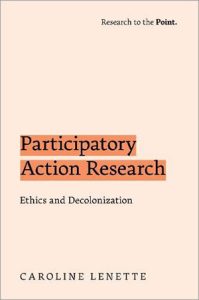Participatory Action Research: Ethics and Decolonization (Research to the Point)

Author: Caroline Lenette
Publisher: Oxford University Press
Year of Publication: 2022
Print Length: 156 pages
Genre: Academic / Methodology & Methods, Non-Fiction / Social Science
Topic: Research, Research Methods, Ethics & Morality, Decolonization & Anti-Colonization, Change, Collaboration & Participation, Community, Social Justice, Solidarity, Politics & Power
Participatory Action Research (PAR) privileges the involvement of participants as co-researchers to generate new knowledge and act on findings to effect social change. In PAR projects, academic researchers collaborate closely with co-researchers, working from the idea that these individuals, especially those who are usually marginalized from institutions, can be engaged in meaningful research activities to achieve social justice outcomes in addition to answering research questions. When deployed ethically in collaboration with co-researchers, PAR’s participatory element facilitates a ‘bottom-up’ approach where knowledge is co-created through grassroots or community-based activities.
This book goes beyond a PAR ‘how to’ manual on the methodology. Rather it synthesizes key learnings in contemporary research, with a distinct focus on the challenging aspects of undertaking PAR in practice and strategies to address these. It provides a clear and user-friendly collection of practical and contextual examples and presents key pointers on the implications of PAR methods, their strengths and weaknesses, and strategies for the field. These examples will be useful for critical class discussions, as well as to anticipate fieldwork pitfalls and pre-empt challenges through collaborative approaches.
Table of Contents
Preface
Acknowledgments
1. What Is Participatory Action Research? Contemporary Methodological Considerations
1.1. Participatory Action Research as a Co-research Model
1.1.1. Participatory Action Research as Social Justice Research for Change / 1.1.2. Applications
1.2. Methodological Framing and Underpinning Principles of Participatory Action Research
1.3. Reciprocity and Vulnerability
1.3.1. Reciprocity / 1.3.2. Vulnerability
1.4. Book Structure
1.4.1. Vignette
1.5. Questions for Discussion
Further Reading and Resources
References
2. Why Decolonize? Participatory Action Research’s Origins, Decolonial Research, and Intersectionality
2.1. Terminology and the Origins of Participatory Action Research
2.2. Smashing the Ivory Tower: Decolonial Research and the Academy
2.2.1. Why Decolonize? / 2.2.2. What Is a Decolonial Research Approach? / 2.2.3. Decolonizing Indigenous Studies
2.3. Participatory Action Research as a Decolonial Approach
2.3.1. Indigenous Participatory Action Research / 2.3.2. Black Participatory Research
2.4. Intersectionality
2.4.1. Decolonial Intersectionality
2.5. Lessons Learned: White Tears and Jokes by Yusra Price
2.6. Questions for Discussion
Further Reading and Resources
References
3. What Does Participation Entail? Challenges to Genuine Participation in Participatory Action Research
3.1. Unpacking Participation
3.1.1. Levels of Participation / 3.1.2. Fostering Meaningful Participation
3.2. The Politics of Participation
3.2.1. Institutionalization of Participation, or “Faux-PAR”
3.3. When Participation Works
3.4. Lessons Learned: Care and Belonging Through Participatory Action Research by Thea Shahrokh
3.5. Questions for Discussion
Further Reading and Resources
References
4. How Do We Engage in Co-research? Co-production and Mess
4.1. Unpacking Co-production
4.1.1. Threats to Co-production / 4.1.2. Co-dissemination
4.2. Mess
4.2.1. Showing and Hiding Mess / 4.2.2. Navigating Mess
4.3. Lessons Learned: The Ups and Downs of Participatory Filmmaking by Natalie Nesvaderani
4.4. Questions for Discussion
Further Reading and Resources
References
5. Participatory Action Research Is Ethical, Right? Ethics in Practice and Institutional Ethics
5.1. Why Pay Attention to Ethics?
5.1.1. Problematizing Ethical Concerns / 5.1.2. Ethics and Community-Based Participatory Research
5.2. Addressing Complex Ethical Concerns
5.2.1. Exercising Agency
5.3. Institutional Ethics Approval
5.3.1. Assessing Participatory Action Research Projects
5.4. Lessons Learned: Open and Closed Doors by Louisa Smith
5.5. Questions for Discussion
Further Reading and Resources
References
6. What of Gender Equality? Feminist Participatory Action Research and Gender Diversity
6.1. Gender Equality
6.1.1. Definitions and the Politics of Language
6.2. Feminist Research
6.2.1. Feminism, Transgenderism, and Trans-Exclusionary Politics
6.3. Feminist Participatory Action Research
6.3.1. Challenges to Feminist Participatory Action Research
6.4. Participatory Action Research and Gender Diversity Studies
6.4.1. Challenging Biomedical Tropes / 6.4.2. Co-production With Cisgender Academic Researchers / 6.4.3. Safer Schools
6.5. Lessons Learned: Gatekeepers of Women’s Experiences
6.6. Questions for Discussion
Further Reading and Resources
References
7. How Do We Influence Policy? Challenges to Knowledge Translation
7.1. Research-Policy Gaps
7.2. Feminist Policy Analysis
7.3. Effecting Policy Change Using Participatory Action Research
7.3.1. Disrupting Policy / 7.3.2. Strategies for Policy Change / 7.3.3. Challenges to Achieving Policy Change
7.4. Lesson Learned: What About Making a Difference? by Nelli Stavropoulou
7.5. Questions for Discussion
Further Reading and Resources
References
Index

Caroline Lenette is Associate Professor, School of Social Sciences and Deputy Director of the Big Anxiety Research Centre at UNSW Sydney. She is a leading interdisciplinary researcher focusing on participatory methods and social justice informed research especially with refugee-background co-researchers. Her scholarship centres on how co-research through creative and artistic means can influence decision-makers and policymaking towards meaningful change. Caroline explores how ethics in research practice is conceptualised in participatory research. She has a passion for arts-health research. Caroline is the author of Arts-based methods in refugee research: Creating sanctuary (2019, Springer) and Participatory Action Research: Ethics and Decolonization (Oxford University Press, 2022).
Source: https://www.unsw.edu.au/staff/caroline-lenette
More from Caroline Lenette in this library, click here.
